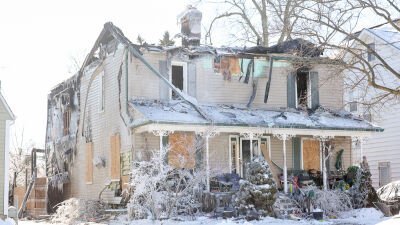MADISON HEIGHTS — At its meeting Nov. 16, the new-look Madison Heights City Council reversed course on two lawsuits filed by marijuana companies.
By a 4-3 vote, both settlement offers were declined, meaning that for now, the city will not allow two more marijuana companies to open in Madison Heights.
To settle the lawsuits, the city would have had to increase the license limits for both medical and recreational marijuana operations. All available licenses are currently held.
Council members Bill Mier, Emily Rohrbach, David Soltis and Quinn Wright voted against the settlement offers, while Mayor Roslyn Grafstein, Mayor Pro Tem Mark Bliss and City Councilman Sean Fleming voted for them.
The city’s legal counsel had recommended approving the offers as a way to head off potentially costly litigation in the future.
Proposals denied
In a letter to council dated Nov. 14, Madison Heights City Manager Melissa Marsh outlined the two projects. The companies behind each project sued the city after the city refused to grant them licenses.
One proposal was for JARS Cannabis, owned by Artic Fox LLC, which would lease the site of the former Mac’s Party Store at 1035 12 Mile Road. Artic Fox would also demo the blue building at 1031 12 Mile Road, formerly J&H Hydraulic Co., and convert it into a parking lot.
In addition, Artic Fox would renovate the plaza, clean up the corner and construct a building at the back of the property, where the processing and grow operation would be located. The company applied for six licenses in August 2022 and filed suit in November 2022.
The second project was for Dispo Cannabis, owned by 305 N Euclid LLC. This development would renovate the site at 32371 Dequindre Road. The company filed its lawsuit against Madison Heights in July 2023, roughly a year after applying for six licenses.
In return for license approval, each company would be required to make a one-time payment to the city of $150,000, plus recurring annual payments of $25,000 to a city community fund, as well as an annual donation of 1% of the preceding year’s net profits. A representative from each company would serve on the committee overseeing the community fund. Each company would also pay $5,000 for each license, plus inspection fees.
Other stipulations included the installation of FLOCK camera systems to monitor the properties and allowing Madison Heights police unfettered access to the footage.
At press time, Reese Serra, representing 305 N Euclid, and Frank DeLuca, representing Artic Fox, had not responded to requests for comment.
The process
To settle the lawsuits, the council would’ve had to make two amendments to the city ordinance.
The first would increase the number of medical marijuana facility licenses for Class C growers (1,500 plants), processors and provisioners from three to five.
The second would increase the number of adult-use recreational marijuana facility licenses (processor and retailer) from three to five. In addition, it would allow for more recreational Class C grow licenses, increasing the limit from 15 to 25.
The city’s legal counsel recommended approval of the settlement agreements, saying it would avoid further costs in court, as well as a trial and appeal.
Prior to the election, the previous City Council, in early October, voted 4-3 to approve the ordinance changes on first reading. But since then, Toya Aaron, one of the “yes” votes, has been replaced by Mier, one of the new council members, who has now voted “no” on the settlement offers.
‘Bullying tactic’
In a series of emails, some council members who voted against the offers explained why.
“I did a lot of homework getting up to speed and meeting with City Manager Marsh and (legal) counsel on the subject,” said Mier, who was elected Nov. 7. “I couldn’t help feeling a little bullied when reading through the settlement wording. While I certainly see the financial good, I wonder how it will affect quality of life, and why we need so many marijuana places in such a small city.
“I am all for economic development and removing vacant buildings, but I couldn’t help but wonder if we are filling vacant buildings only to create newer vacant buildings by driving others out of business,” he said. “I have talked to very few residents that are in favor of adding any more dispensaries. Common sense told me it was not the right thing for residents.”
Rohrbach, who also voted against the settlement offer, said she has also heard from residents concerned about “too many” marijuana businesses opening in town.
“All three of our license holders were head and shoulders above the others in their applications and were granted the limited licenses. When several of the companies who did not get licenses decided to sue the city, I was always of the mind that a settlement was out of the question, because it wasn’t in our best interest,” Rohrbach said. “We developed a process and we followed that process, and this was simply pressure from outside in the form of a lawsuit to change our process just for them — not because they were the best option for our city, but because they thought we would fold. I felt that was a bullying tactic that would open the floodgates for anyone to sue the city.”
Wright declined to comment, noting that litigation is ongoing. Soltis declined comment, as well.
‘Each case is unique’
Bliss, one of the “yes” votes, said on the phone that the city was not simply caving to every company that sues, having recently declined offers by two other companies. He also noted that there have been times when the city took a settlement after a business sued, and it worked out well.
“With Meijer, the city first denied them. Meijer sued City Council, and Madison Heights took a settlement and allowed them to come in. That was about 20 years ago, and there is not a single person upset about that decision 20 years ago,” Bliss said. “While I understand the concept of a slippery slope, I also think that every one of these decisions needs to be taken independently since each case is unique. And I think when our special counsel, our city attorney and our city manager all recommend that we do something because it’s in our best interest, then we should trust these people we hired for their expertise.”
Fleming, another “yes” vote, pushed back against the idea of too many marijuana businesses.
“It’s inevitable you will have people suing you when you say ‘no’ when they want something, but there are several things to consider. Are they doing something illegal? No, they’re not. Is it a repetitive business? Well, sure, people in the city may not want another marijuana business, but there are other businesses here that are repetitive, like burger joints and car washes. So the question is, what’s the cost relative to the harm, or lack thereof? In the grand scheme of things, settling might be what’s best for the budget,” Fleming said. “Nobody wants to be bullied over this, but if we’re spending a lot of money on litigation, we have less money for special projects and programs. We need to enlarge our budget in any way possible if we’re to make improvements in our city, like streetscaping in our downtown area. Those are important items for people, as well.”
The mayor said that it’s unfortunate the city didn’t settle and didn’t amend the city ordinance. She said that the city’s current license holders have been a boon for Madison Heights.
“As expected, these existing dispensaries have made significant economic contributions to the city with an increase in taxable property that allowed us to reduce our millage last year,” Grafstein said in an email. “The original language of the ordinance was designed so that council could change the number of locations from time to time, so (adding more) was always a possibility. … In addition, changing our ordinance to allow more licenses does not mean that they will be issued. It is just opening up the possibility, should an opportunity arise where that is the best decision for the city and our residents.”
 Publication select ▼
Publication select ▼




























